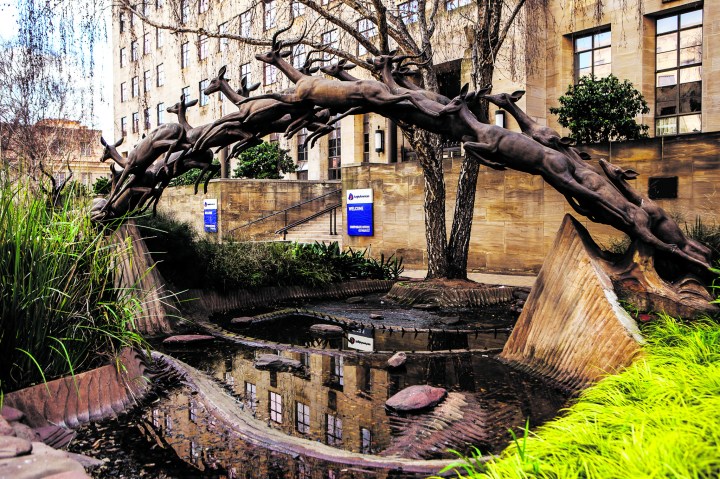BUSINESS MAVERICK 168
Platinum class: Why Amplats is being so generous to its shareholders

A few years ago, platinum was looking like a bad business to be in. Now Amplats is enjoying the commodities boom and paying out large dividends. The company’s profits don’t only benefit shareholders, though.
First published in the Daily Maverick 168 weekly newspaper.
For the 2015 financial year, Anglo American Platinum (Amplats) posted a loss in headline earnings of R1-billion. In 2014, when the company was hit by an unprecedented five-month strike led by the Association of Mineworkers and Construction Union (Amcu), it had managed to eke out headline earnings of R786-million. In 2013 and 2012 it had posted losses, according to its online results statements from those years.
Platinum production was looking like a bad space to be in and Amplats, and its peers, were hardly paying dividends. As an asset class, platinum was more like plutonium – it was radioactive to many fund managers and other investors.
But under previous CEO Chris Griffith – and with the guidance of Anglo American CEO Mark Cutifani, an engineer by training with a technical cast of mind – Amplats embarked on a turnaround strategy that with the benefit of hindsight was a masterstroke. Partly in response to the waves of labour unrest that shook the platinum sector with the emergence of Amcu in the shafts in 2012, the company made a pivot to mechanisation, selling most of its labour-intensive assets to Sibanye-Stillwater.
The geology of the platinum belt does not easily lend itself to mechanisation, because of the narrowness of the reef and the steepness of the gradients. But technology is overcoming such challenges, and the replacement of men with machines underground makes mining far safer – and more productive. It also undermines the power of labour. It is no coincidence that there has been no repeat of the mammoth 2014 strike or the wave of violence that culminated in the 2012 Marikana massacre, when police shot dead 34 workers taking part in a wildcat strike.
This positioned the company to cash in if and when prices, which had been depressed for years, began to rise again. And, for a range of reasons, including the move to petrol from diesel engines in key markets, the prices of platinum group metals (PGMs) have rebounded – in spectacular fashion.
“PGM prices were strong during the period under review, as a recovering global economy and firm automotive and industrial demand were aided by supply disruptions in Russia,” Amplats noted in its interim 2021 results, published on Monday 26 July.
“In US dollar terms, the average achieved PGM basket price increased by 47% year on year to $2,884 per PGM ounce. Rhodium and palladium set new all-time highs of $30,000 and $3,000 per ounce, respectively, while platinum hit a six-year high above $1,300 per ounce,” the company said.
The result was record half-year profits, with earnings before interest, taxes, depreciation and amortisation up almost 400% to R63.3-billion. Shareholders have been rewarded with a massive interim dividend of R175 per share, or R46.4-billion. This equates to a whopping 100% payout of headline earnings to shareholders.
Many companies pay out dividends as a percentage of normalised or headline earnings – say, 25% to 40%. That is the policy of Anglo American itself. The rest of the capital generated from profits is often used for a range of things: shoring up the balance sheet with cash reserves, paying down debt, investing in ongoing projects, or perhaps acquisitions.
But Amplats’s options are limited, and its shareholders have had many a dry year at the dividend tap. For one thing, it mines and produces PGMs, the bulk of which are found in South Africa – a stark fact of geology and geography. It’s not about to explore in, say, Equatorial Guinea, a fictionalised version of which was the setting for the Frederick Forsyth novel The Dogs of War, in which British industrialists fund a coup after the discovery of a mountain of platinum.
Fictional discoveries in repressive African states aside, outside of South Africa, the PGM pickings get a lot thinner. There is Zimbabwe, where Amplats already has operations. Russia also has rich PGM deposits. Expanding in or into either country is hardly going to boost Amplats’s “risk profile”, to use the corporate jargon. In the US and Canada, the best PGM offerings have already been snapped up by Sibanye-Stillwater and Impala Platinum. Colombia has some PGMs, but cocaine is probably a bigger cash cow there.
In South Africa itself, Amplats seems to be bedding down on its existing assets, which have for the most part become cash spinners of note. It is looking at underground exploration and possible expansion to its open-cast and mechanised Mogalakwena mine in Limpopo. But there is no brand-new mine in the offing or anything on that kind of scale.
Platinum producers don’t want to flood the market with product from new mines. The scarcity of PGMs supports the price.
The upshot is that Amplats’s pot of cash has gone mostly to shareholders. Of course, given the historical background to South Africa’s mining industry, which included the grotesque, century-long exploitation of a mostly migrant labour force, this windfall is bound to raise hackles in some quarters. South Africa’s disparities of wealth and income remain world-leading, and the fat cats are getting fatter. But that narrative misses some wider points.
Looking at Amplats’s shareholder base, close to 80% is held by the mothership, Anglo American, which has its primary listing in London. So a lot of that money is going north, following old historical routes, when low grades and the capital required for deep-level gold mining meant the only way to attract foreign investors was to keep wages exploitatively low. But the stereotype of a smirking plutocrat smoking a cigar amid bags of cash does not capture the trajectory of capitalism in the 21st century.
For one thing, Anglo American’s biggest shareholder is the Public Investment Corporation (PIC), which manages the savings of South Africa’s public servants. There are a number of pension funds among its investors, including the Church of England’s, which was among the shareholders that pressed Anglo to get out of coal. PGMs are not the only catalyst out there – shareholders and investors can also be catalysts for positive change, and are increasingly so as some of the worst excesses of capitalism are brought to heel in the 21st century. The bottom line is that Anglo’s shareholding includes lots of hard-working, ordinary people who are saving for the proverbial rainy day.
To return to Amplats – a company with few big expansion or acquisition options in its core business – it was not only its shareholders that reaped dividends from its performance in the first six months of this year.
The company’s economic contribution to stakeholders included R5.5-billion in wages and salaries – including vulnerable employees not yet back at work because of the pandemic – as well as local procurement of goods and services worth R2.2-billion.
It also invested R5.2-billion in capital projects. The company is not about to acquire a mountain of platinum in Equatorial Guinea, but it is still spending on capital projects. It has a lot of R&D in the pipeline. It also paid R16.6-billion to the fiscus through taxes and royalties, R14.4-billion more than it did in the first six months of last year.
When President Cyril Ramaphosa announced that better revenue collection gave the government room to reintroduce the R350 per month social relief grants, the mining sector was clearly the main source. It is not coming from tourism, restaurants or booze.
The commodities cycle is also the main driver behind South Africa’s hefty trade and current account surpluses, which have underpinned the rand’s relative robustness and helped keep the lid on inflation – which hits the poorest of the poor the hardest. This is also helping to keep interest rates low.
So yes, Amplats’ shareholders have been richly rewarded, and not all of them have a maniacal laugh while they count their cash in a Scrooge McDuck kind of way. Anglo American itself, which unveiled its half-year results on Thursday, is giving its shareholders $4.1-billion.
Of this, $2.1 billion is an interim dividend, equal to $1.71 per share, which is 40% of its underlying earnings. This has been topped off with $1.0 billion special dividend and a $1.0 billion share buyback.
South Africa’s status as the world’s biggest producer of PGMs is no bad thing for Anglo shareholders at the moment. And it’s no bad thing for the wider economy, not to mention the country’s social fabric, which has clearly been under some strain of late. DM168
This story first appeared in our weekly Daily Maverick 168 newspaper which is available for R25 at Pick n Pay, Exclusive Books and airport bookstores. For your nearest stockist, please click here.



















Well done Anglo Platinum. But, and here’s the big but, $46 billion to shareholders, and $5,5 billion in wages and salaries, yet Ed Stoddard claims that some of the worst excesses of capitalism are being brought to heel. What is it, other than an example of the worst excesses of capitalism when shareholders earn nine times the total wage and salary bill. In any sustainable “non-excesses” capitalist system surely those who do the work should deserve more than those who are already rich enough to do nothing other than put up the capital?
Yes – and whilst you’re talking of excesses, look at the ratio between Cutifani’s and workers’ remuneration.